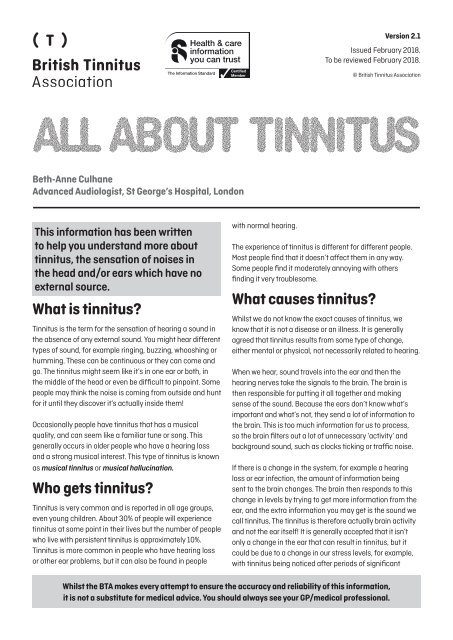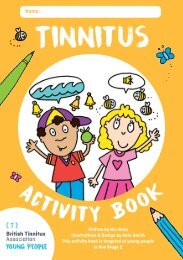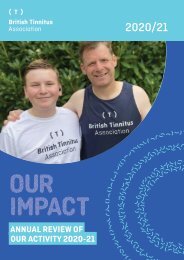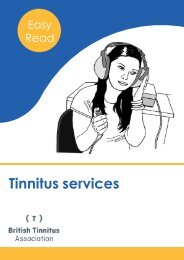All about tinnitus Ver 2.1
You also want an ePaper? Increase the reach of your titles
YUMPU automatically turns print PDFs into web optimized ePapers that Google loves.
<strong>Ver</strong>sion <strong>2.1</strong><br />
Issued February 2018.<br />
To be reviewed February 2018.<br />
© British Tinnitus Association<br />
ALL ABOUT TINNITUS<br />
Beth-Anne Culhane<br />
Advanced Audiologist, St George’s Hospital, London<br />
This information has been written<br />
to help you understand more <strong>about</strong><br />
<strong>tinnitus</strong>, the sensation of noises in<br />
the head and/or ears which have no<br />
external source.<br />
What is <strong>tinnitus</strong>?<br />
Tinnitus is the term for the sensation of hearing a sound in<br />
the absence of any external sound. You might hear different<br />
types of sound, for example ringing, buzzing, whooshing or<br />
humming. These can be continuous or they can come and<br />
go. The <strong>tinnitus</strong> might seem like it’s in one ear or both, in<br />
the middle of the head or even be difficult to pinpoint. Some<br />
people may think the noise is coming from outside and hunt<br />
for it until they discover it’s actually inside them!<br />
Occasionally people have <strong>tinnitus</strong> that has a musical<br />
quality, and can seem like a familiar tune or song. This<br />
generally occurs in older people who have a hearing loss<br />
and a strong musical interest. This type of <strong>tinnitus</strong> is known<br />
as musical <strong>tinnitus</strong> or musical hallucination.<br />
Who gets <strong>tinnitus</strong>?<br />
Tinnitus is very common and is reported in all age groups,<br />
even young children. About 30% of people will experience<br />
<strong>tinnitus</strong> at some point in their lives but the number of people<br />
who live with persistent <strong>tinnitus</strong> is approximately 10%.<br />
Tinnitus is more common in people who have hearing loss<br />
or other ear problems, but it can also be found in people<br />
with normal hearing.<br />
The experience of <strong>tinnitus</strong> is different for different people.<br />
Most people find that it doesn’t affect them in any way.<br />
Some people find it moderately annoying with others<br />
finding it very troublesome.<br />
What causes <strong>tinnitus</strong>?<br />
Whilst we do not know the exact causes of <strong>tinnitus</strong>, we<br />
know that it is not a disease or an illness. It is generally<br />
agreed that <strong>tinnitus</strong> results from some type of change,<br />
either mental or physical, not necessarily related to hearing.<br />
When we hear, sound travels into the ear and then the<br />
hearing nerves take the signals to the brain. The brain is<br />
then responsible for putting it all together and making<br />
sense of the sound. Because the ears don’t know what’s<br />
important and what’s not, they send a lot of information to<br />
the brain. This is too much information for us to process,<br />
so the brain filters out a lot of unnecessary ‘activity’ and<br />
background sound, such as clocks ticking or traffic noise.<br />
If there is a change in the system, for example a hearing<br />
loss or ear infection, the amount of information being<br />
sent to the brain changes. The brain then responds to this<br />
change in levels by trying to get more information from the<br />
ear, and the extra information you may get is the sound we<br />
call <strong>tinnitus</strong>. The <strong>tinnitus</strong> is therefore actually brain activity<br />
and not the ear itself! It is generally accepted that it isn’t<br />
only a change in the ear that can result in <strong>tinnitus</strong>, but it<br />
could be due to a change in our stress levels, for example,<br />
with <strong>tinnitus</strong> being noticed after periods of significant<br />
Whilst the BTA makes every attempt to ensure the accuracy and reliability of this information,<br />
it is not a substitute for medical advice. You should always see your GP/medical professional.
stress, a change in life circumstances or general wellbeing.<br />
People often say that they are aware of noises in the ears<br />
when they have a cold, an ear infection or wax blocking the<br />
ear. Sometimes people become aware of <strong>tinnitus</strong> following<br />
a really stressful event and once they’re aware of it, seem<br />
to notice it more and more, but this usually fades once<br />
these things have passed. However, some people continue<br />
to notice the <strong>tinnitus</strong>, for example after an infection has<br />
cleared up.<br />
Fortunately, <strong>tinnitus</strong> is rarely an indication of a serious<br />
disorder and a doctor will be able to check this for you.<br />
What should I do?<br />
The first person to talk to is your GP. You may need to be<br />
referred to an Ear, Nose and Throat (ENT) Surgeon or an<br />
Audiovestibular Physician, who will rule out any medical<br />
factors, assess your hearing and probably give you some<br />
information <strong>about</strong> what <strong>tinnitus</strong> is and how best to manage<br />
it. Some hospitals have hearing therapists or specially<br />
trained audiologists who are available to offer more<br />
support, if you need it.<br />
The most important thing to do is to keep doing the<br />
things you enjoy. If you start living your life differently to<br />
accommodate the <strong>tinnitus</strong>, it’s just going to seem more of a<br />
problem. You may need to do things differently, for example<br />
reading with some background music on, but it’s important<br />
that you do them nonetheless.<br />
It does improve<br />
When you first experience <strong>tinnitus</strong>, you may naturally be<br />
worried and very aware of this new sound. We constantly<br />
monitor our bodies and if anything changes, we become<br />
aware of the changes. Hearing <strong>tinnitus</strong> for the first time can<br />
be quite frightening if you think it means that something is<br />
wrong with you, or that it might change your life. It’s a new<br />
sensation and you need to give yourself time to adapt.<br />
Most people find that their <strong>tinnitus</strong> does seem to settle<br />
down after this initial period, even without doing anything<br />
in particular. You might hear this being referred to as<br />
habituation. It’s a bit like walking into a room with a noisy<br />
fan or air conditioner. Initially, it seems really loud and then<br />
after a while, you stop noticing it as much. Tinnitus can<br />
often be much the same – initially, it’s more noticeable<br />
but you gradually notice it less than you did. The first time<br />
you realise it’s in the background is a great moment – it<br />
confirms that there are times when it’s less noticeable,<br />
which means you should be able to keep doing the things<br />
that you enjoy doing.<br />
Things that can help<br />
Talking to someone<br />
People around you may not understand what <strong>tinnitus</strong> is and<br />
how it might affect you, so might not be able to give you the<br />
type of support you need. It can be really helpful to talk to<br />
someone who has experience of <strong>tinnitus</strong>.<br />
Meeting people who have been through the same things<br />
you are going through right now can be very helpful. There<br />
are Tinnitus Support Groups around the country. Not only<br />
can you pick up tips from others, but you can gain (and<br />
give) support simply by sharing your story with people who<br />
understand because they’ve been there themselves.<br />
The BTA offers a confidential <strong>tinnitus</strong> helpline.You can call<br />
us for support, and we may also be able to point you in the<br />
right direction for local support groups.<br />
Relaxation<br />
It is quite common to feel anxious and afraid when you first<br />
experience <strong>tinnitus</strong>. By relaxing more, you may be able to<br />
feel less stressed and so notice your <strong>tinnitus</strong> less. Learning<br />
to relax is probably one of the most useful things you can<br />
do to help yourself.<br />
A really easy way to relax is to find somewhere peaceful<br />
and just slow your breathing down (feel free to have some<br />
sound on in the background). You can take a few slow deep<br />
breaths and pay full attention to the feeling of the breath<br />
entering your body, filling your lungs and leaving your body.<br />
When we use deep breathing to relax, we feel calmer and<br />
more able to manage the <strong>tinnitus</strong>, and often don’t notice it<br />
as much!<br />
Using a hearing aid<br />
Loss of hearing is often an unnoticeable and gradual<br />
process, and many people are surprised when they are<br />
told that they have a hearing loss. If you have hearing loss,<br />
using hearing aids can be helpful for <strong>tinnitus</strong> because they<br />
are restoring what you can’t otherwise hear.<br />
Using sound<br />
Tinnitus is usually more noticeable in a quiet environment.<br />
It’s a bit like candles on a birthday cake – in the lights, the<br />
candles aren’t very bright but if you turn the lights off, the<br />
candles seem much brighter. With <strong>tinnitus</strong>, when there is<br />
Whilst the BTA makes every attempt to ensure the accuracy and reliability of this information,<br />
it is not a substitute for medical advice. You should always see your GP/medical professional.
other sound, it doesn’t seem that loud, but when you turn<br />
all the other sound off, the <strong>tinnitus</strong> seems much more<br />
noticeable.<br />
A lot of people have found that using background sound<br />
helps them – this can be a radio, music, or using natural<br />
sounds. People are really good at figuring out ways of<br />
making things better for themselves and you might already<br />
be aware that you generally don’t notice the <strong>tinnitus</strong> as<br />
much when there is background noise. By using sound at<br />
other times, you’re just using other ways of doing what you<br />
already know to be helpful.<br />
Addressing sleep problems<br />
People who live with <strong>tinnitus</strong> might have difficulty falling<br />
asleep or staying asleep. In order to sleep well, our bodies<br />
and our minds need to be relaxed. Worrying <strong>about</strong> the<br />
<strong>tinnitus</strong>, or worrying <strong>about</strong> how much sleep you’re getting<br />
(or missing out on), is unhelpful and will only make it more<br />
difficult to sleep. Most people with <strong>tinnitus</strong> sleep well and<br />
their <strong>tinnitus</strong> is no different from those who do not sleep<br />
well. People who have <strong>tinnitus</strong> and sleep poorly tend to<br />
worry more at night than people with <strong>tinnitus</strong> who sleep<br />
well. Working through problems during waking hours<br />
is better than in the middle of the night when you have<br />
nothing else to occupy you.<br />
It helps to make use of relaxation techniques to prepare the<br />
body for sleep. Once your body and mind are relaxed, sleep<br />
will come a bit easier.<br />
Having some soft sound in the bedroom can help some<br />
people with <strong>tinnitus</strong> sleep better. The type of sound you use<br />
is up to you – as long as it is pleasant or neutral.<br />
Professional support<br />
If you are referred to a specialist <strong>tinnitus</strong> clinic, and your<br />
<strong>tinnitus</strong> is particularly troublesome, you will be introduced<br />
to more formal or structured ways of managing <strong>tinnitus</strong>.<br />
Most centres use a combination of approaches. You may<br />
come across some terms before, or hear them when you<br />
get there, and it helps to have some understanding of what<br />
these terms are.<br />
Cognitive Behavioural Therapy (CBT) - this is one<br />
psychological approach that can be useful in managing<br />
<strong>tinnitus</strong>. The idea is that when you became aware of your<br />
<strong>tinnitus</strong>, you responded to it negatively. For example, you<br />
may have thought there was something seriously wrong<br />
with your hearing (a belief) and this led to you being anxious<br />
(an emotion), and you then tried to feel better, for example<br />
by avoiding silence (a behaviour). Some beliefs and<br />
behaviours are helpful and that’s great – keep doing them!<br />
But some beliefs and/or behaviours are unhelpful and CBT<br />
helps you to recognise them, and then you work together<br />
with the clinician (usually a psychologist, audiologist or<br />
hearing therapist) to find different ways of responding to<br />
the <strong>tinnitus</strong> so it becomes less bothersome.<br />
Mindfulness - this is a meditation technique that is used<br />
frequently for pain management, and more recently for<br />
<strong>tinnitus</strong>. The idea is that we tend to resist unpleasant<br />
sensations (eg hearing <strong>tinnitus</strong>). If we stop resisting and<br />
allow the unpleasant sensation, this alters our awareness to<br />
include more sensations. We start to notice that sensations<br />
become less dominant once our attention moves away<br />
from them and focuses on a different part of the body.<br />
<strong>All</strong> of this can change in a moment, simply by changing<br />
our awareness. If we use mindfulness effectively, we can<br />
create some space from the <strong>tinnitus</strong> and in that space, we<br />
can decide how we’re going to respond to it. It’s a wonderful<br />
way of achieving ‘peace and quiet’.<br />
Tinnitus Retraining Therapy (TRT) - this is a very structured<br />
approach to managing <strong>tinnitus</strong>. Basically, TRT assumes that<br />
the <strong>tinnitus</strong> has been prioritised as an important signal. TRT<br />
uses sounds at a particular level to try to reduce the priority<br />
of the <strong>tinnitus</strong> so that you no longer hear it. It is based on<br />
the idea that we can get used to sounds, e.g. the sound of<br />
the fridge or air conditioner, so we can also get used to this<br />
sound of <strong>tinnitus</strong>. The process of getting used to the <strong>tinnitus</strong><br />
sound is called habituation. TRT uses sound generators and<br />
counselling to attempt to retrain how the brain processes<br />
sound so that you habituate to the <strong>tinnitus</strong>. Most people<br />
working in the <strong>tinnitus</strong> field will use elements of TRT but<br />
the strict method is not frequently used because there is<br />
limited evidence for its effectiveness.<br />
Take care of your hearing<br />
Frequent, prolonged exposure to loud noise increases the<br />
risk of getting <strong>tinnitus</strong>, or of making it worse, so take care<br />
to avoid very loud sounds, or protect your ears against<br />
them. Wear proper ear protectors (not cotton wool) when<br />
hammering metal, using power tools or when you are<br />
near any noisy motors. Ear protection is also important<br />
if you watch live music or play in a band or orchestra.<br />
Ear protection should not be used if ordinary, everyday<br />
sounds are uncomfortable (this may be hyperacusis or<br />
oversensitivity to sound). If ear plugs are worn for blocking<br />
Whilst the BTA makes every attempt to ensure the accuracy and reliability of this information,<br />
it is not a substitute for medical advice. You should always see your GP/medical professional.
out such sounds, it can actually make hyperacusis worse.<br />
Hyperacusis<br />
Hyperacusis is an increased sensitivity to sound. If you<br />
find that everyday or ordinary sounds are uncomfortable,<br />
you may have hyperacusis. Whilst it might seem natural<br />
to want to block out as much sound as possible, avoiding<br />
sound can actually make hyperacusis worse. Talk to your<br />
GP <strong>about</strong> this and ask for a referral to either an ENT Surgeon<br />
or Audiovestibular Physician who will be able to suggest<br />
management options – often, using sound (in a very<br />
controlled way) can improve hyperacusis.<br />
More information<br />
Having information <strong>about</strong> <strong>tinnitus</strong> can be very helpful. A lot<br />
of people start off looking online and while there is some<br />
fantastic information available on the internet, there is also<br />
a lot of very unhelpful information. An easy way to ensure<br />
what you are reading is appropriately written and produced<br />
is to check that the Information Standard has been adhered<br />
to - you can see the logo on the front page, as all BTA<br />
information complies with the Information Standard.<br />
References<br />
A list of the references consulted in preparing this leaflet is<br />
available on request.<br />
Alternative formats<br />
This publication is available in large print, Easy Read and<br />
audio formats on request.<br />
For further information<br />
Our helpline staff can answer your questions on any <strong>tinnitus</strong><br />
related topics on 0800 018 0527. You may also find our<br />
website takeon<strong>tinnitus</strong>.co.uk helpful.<br />
BTA publications<br />
Our information leaflets are written by leading <strong>tinnitus</strong><br />
professionals and provide accurate, reliable and<br />
authoritative information which is updated regularly.<br />
Please contact us if you would like to receive a copy of<br />
any of our information leaflets listed below, or they can be<br />
downloaded from our website. *available in Easy Read<br />
<strong>All</strong> <strong>about</strong> <strong>tinnitus</strong>*<br />
Balance and <strong>tinnitus</strong><br />
Complementary therapy for <strong>tinnitus</strong>: an opinion<br />
Drugs and <strong>tinnitus</strong><br />
Ear wax removal and <strong>tinnitus</strong><br />
Flying and the ear<br />
Food, drink and <strong>tinnitus</strong><br />
Hearing aids and <strong>tinnitus</strong>*<br />
Hyperacusis<br />
Ideas for relaxation without sound<br />
Information for musicians<br />
Musical hallucination (musical <strong>tinnitus</strong>)<br />
Noise and the ear<br />
Otosclerosis<br />
Pulsatile <strong>tinnitus</strong><br />
Relaxation<br />
Self help for <strong>tinnitus</strong>*<br />
Sound therapy<br />
Sources of mutual support for <strong>tinnitus</strong><br />
Supporting someone with <strong>tinnitus</strong><br />
Taming <strong>tinnitus</strong><br />
Tinnitus: a parent’s guide<br />
Tinnitus: a teacher’s guide<br />
Tinnitus and disorders of the temporo-mandibular joint<br />
(TMJ) and neck<br />
Tinnitus and sleep disturbance<br />
Tinnitus and stress<br />
Tinnitus services*<br />
Leaflets for children:<br />
Ellie, Leila and Jack have <strong>tinnitus</strong> (for under 8s)<br />
Tinnitus (for 8-11 year olds)<br />
Tinnitus (for 11-16 year olds)<br />
Ellie, Leila and Jack have <strong>tinnitus</strong> activity book<br />
Tinnitus activity book (for 8-11 year olds)<br />
Tinnitus activity book (for 11-16 year olds)<br />
British Tinnitus Association<br />
Ground Floor, Unit 5, Acorn Business Park, Woodseats Close, Sheffield S8 0TB<br />
Email: info@<strong>tinnitus</strong>.org.uk<br />
Helpline: 0800 018 0527<br />
Website: <strong>tinnitus</strong>.org.uk<br />
The British Tinnitus Association. Registered charity no: 1011145 Company limited by guarantee no: 2709302. Registered in England. This information has<br />
been produced by the BTA and conforms to the Principles and Requirements of the Information Standard.<br />
Whilst the BTA makes every attempt to ensure the accuracy and reliability of this information,<br />
it is not a substitute for medical advice. You should always see your GP/medical professional.


















